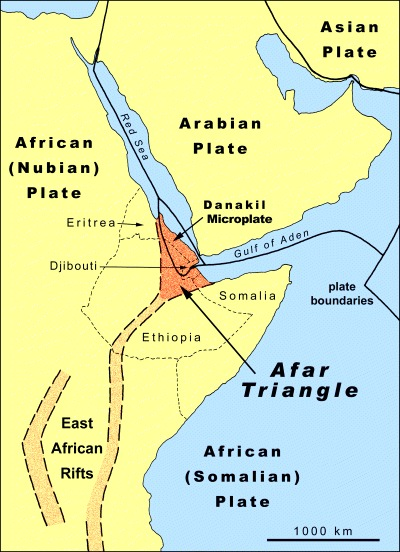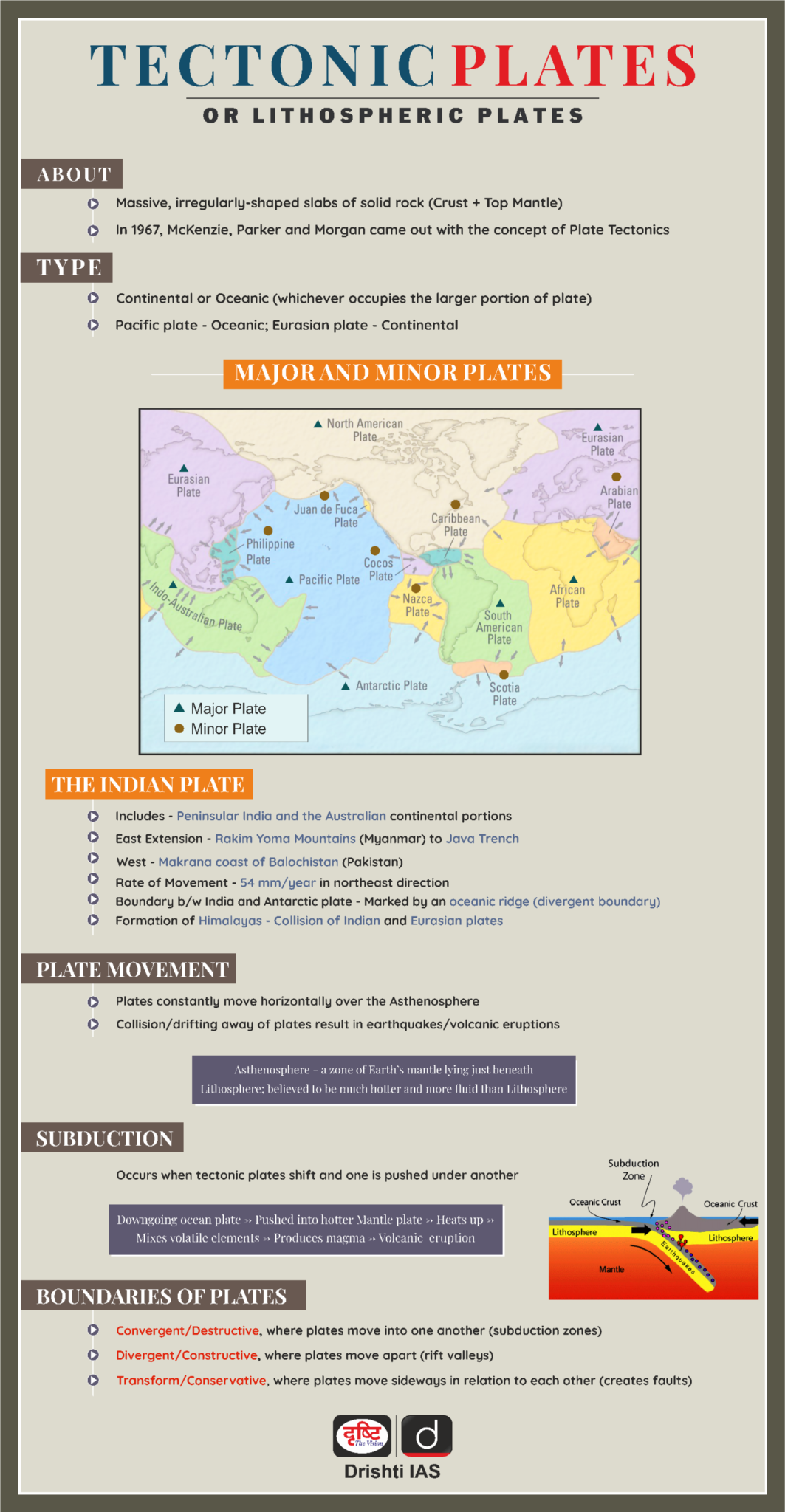Important Facts For Prelims
Africa's Afar Triangle: Birthplace of a Potential New Ocean
- 02 Apr 2024
- 5 min read
Why in News?
Recent geological findings suggest that Africa's Afar Triangle could be the birthplace of a new ocean in 5 to 10 million years.
- This phenomenon, unfolding amidst the rich and diverse landscapes of the African continent, offers a rare glimpse into the dynamic processes that shape Earth's geography.
What is Africa’s Afar Triangle?
- About: The Afar Triangle, nestled in the Horn of Africa, is a geological depression where three tectonic plates, the Nubian, Somali, and Arabian plates converge.
- It is part of the East African Rift system, which extends from the Afar region down through eastern Africa.
- Beyond its geological significance, the Afar Triangle holds a rich paleontological history, disclosing fossil specimens of some of the earliest hominins.
- Tectonic Movement and Rift Expansion: The Afar region has been experiencing gradual tectonic movements for millions of years.
- The rift's expansion was notably highlighted in 2005 when a significant rift opened up in the Ethiopian desert, indicating the ongoing separation of the African continent at a tectonic level.
- Factors Responsible for Rift’s Expansion:
- One of the key factors driving the rifting process is believed to be a massive plume of superheated rocks rising from the mantle beneath East Africa.
- This plume could be exerting pressure on the overlying crust, causing it to stretch and fracture.
- Also, the magmatism in the region, particularly at the Erta Ale volcano, offers clues to the tectonic transition, with characteristics that mimic those of a mid-ocean ridge.
- Magmatism is the formation and motion of magma below Earth's surface. It contributes to various phenomena on Earth, such as filling tectonic cracks, forming mountains, and aiding in the release of heat from the Earth's core.
- One of the key factors driving the rifting process is believed to be a massive plume of superheated rocks rising from the mantle beneath East Africa.
- Formation of Ocean: This ongoing rift expansion in this region could potentially lead to the formation of a new ocean, tentatively named the "Alvor-Teide Atlantic Rift".
- This new body of water would be the result of the Red Sea and the Gulf of Aden flooding over the Afar region and into the East African Rift Valley.
Key Terms
- Tectonic Movement: Tectonic movement refers to the large-scale motion of the Earth's lithosphere caused by the interactions of tectonic plates.
- There are three main types boundaries formed due to tectonic movements: Divergent Boundaries, Convergent Boundaries and Transform Boundaries
- Rifting: Rifting refers to the geological process where the Earth's Lithosphere (the outermost layer of the Earth) is stretched and thinned, leading to the formation of rift valleys or basins.
- This process usually occurs at divergent plate boundaries where tectonic plates move away from each other.
- As the plates move apart, tensional forces cause the lithosphere to crack and break, creating rift zones.
- Mid-Oceanic Ridge: A mid-oceanic ridge is a long underwater mountain range that forms along divergent boundaries between tectonic plates in the oceanic crust.
- These ridges are characterised by volcanic activity and the upwelling of magma from the mantle, which solidifies to form a new oceanic crust.
- Mid-oceanic ridges are key features of seafloor spreading, where new crust is continuously created as tectonic plates move apart.
UPSC Civil Services Examination, Previous Year Question (PYQ)
Q. Consider the following: (2013)
1. Electromagnetic radiation
2. Geothermal energy
3. Gravitational force
4. Plate movements
5. Rotation of the earth
6. Revolution of the earth
Which of the above are responsible for bringing dynamic changes on the surface of the earth?
(a) 1, 2, 3 and 4 only
(b) 1, 3, 5 and 6 only
(c) 2, 4, 5 and 6 only
(d) 1, 2, 3, 4, 5 and 6
Ans: (d)






